Searching within JSON fields in Postgres, with EFCore 3
With it sounding so simple, you wouldn’t expect the hoops you’d have to go though!
Initial setup⌗
My use-case is translations. I don’t want to join on another table every time, and want to be able to scale to add new languages easily. To do that, I’m going to make a strongly typed class called Translations that extends Dictionary<string, Dictionary<string, string>>. The outer key is the language, and the inner key is the translation key. The value is the translated string. That’s all I really need, but for the sake of this blog post, I’ll add a helper method to add translations easily, making our class look like this:
public class Translations : Dictionary<string, Dictionary<string, string>>
{
public Translations Add(string language, string key, string value)
{
if (!ContainsKey(language))
{
this[language] = new Dictionary<string, string>();
}
this[language][key] = value;
return this;
}
}
My entity I’ll be using to test this with, is very simple, just an id and the translations, making sure to specify to EFCore that it’s of json type.
public class MyEntity
{
[Key]
public Guid Id { get; set; }
[Column(TypeName = "json")]
public Translations Translations { get; set; }
}
I’ll create an initial migration, and add a few entires:
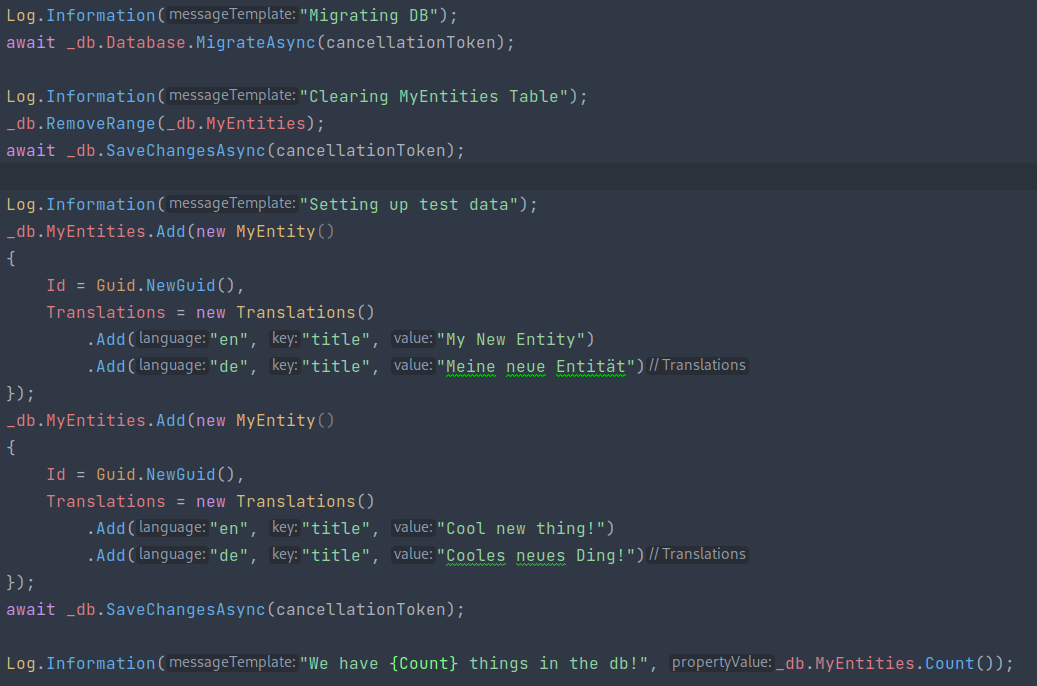
Then print out what we have:

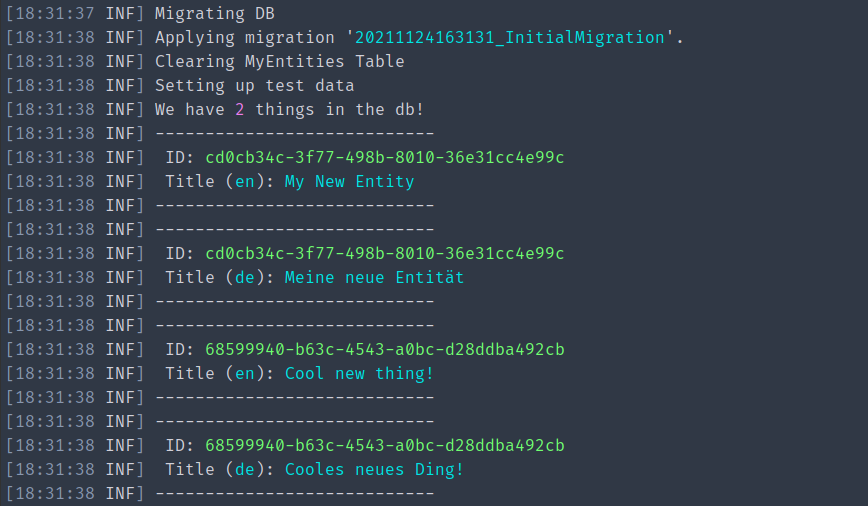
The problem⌗
Now, selecting the German strings works, so what’s the problem?


It’s when we search for them!

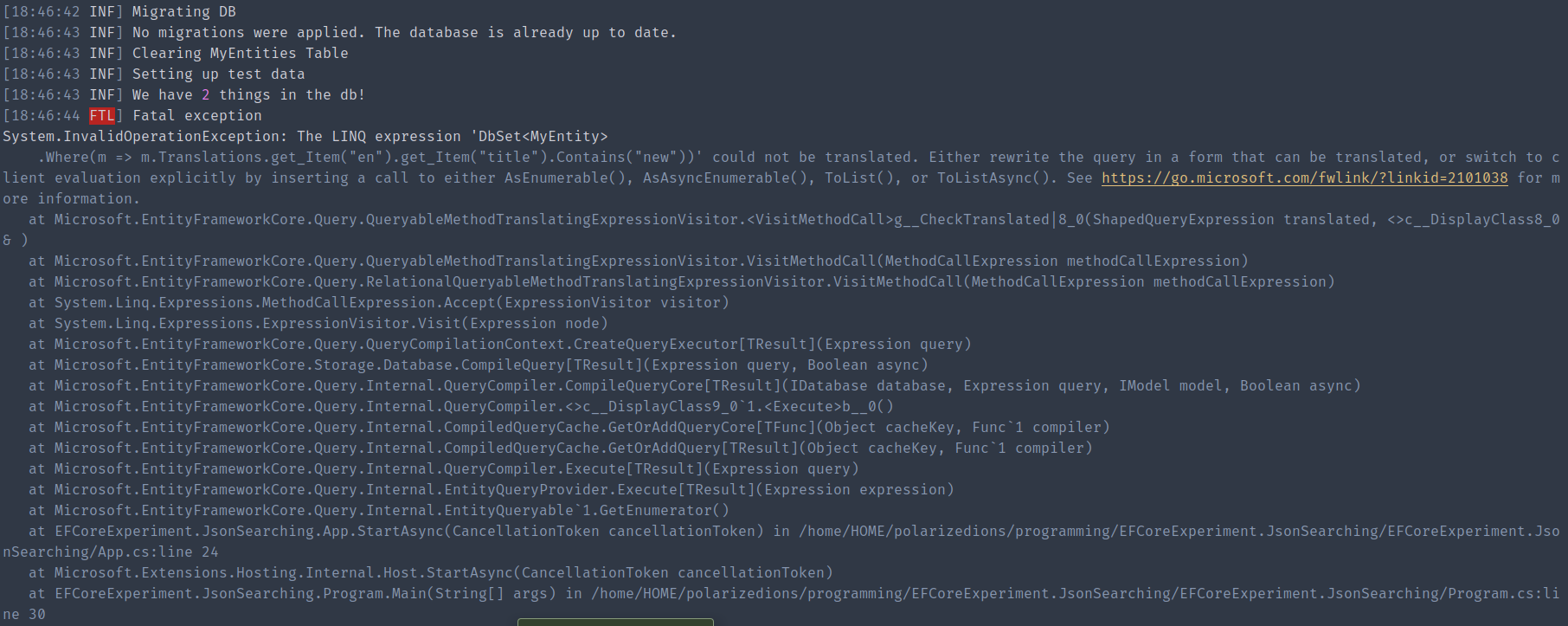
We get a very nice exception, saying it can’t translate our linq to SQL. So how do we solve this?
EFCore DB Function mappings!⌗
While the documentation is a bit lacking, it’s a very simple concept: We create a strong typed method in our code, and tell EFCore “when you see this method, call this SQL instead”.
First, we need to create that strong typed method.
public static class MyDbFunctions
{
public static string GetTranslations(Translations column, string language, string key) =>
throw new NotImplementedException("Must be called on the db!");
}
EFCore will replace its functionality when translating to SQL, so it doesn’t matter what we make it’s value. For simplicity’s sake, I just throw an exception. This will only get called when it does client side evaluation.
Next, we’ll tell EFCore about it, in the OnModelCreating method in our DatabaseContext:
protected override void OnModelCreating(ModelBuilder modelBuilder)
{
var getTranslationsFunction = modelBuilder
.HasDbFunction(typeof(MyDbFunctions).GetMethod(nameof(MyDbFunctions.GetTranslations)))
.HasTranslation(args =>
SqlFunctionExpression.Create("json_extract_path_text", args, typeof(string), new StringTypeMapping("NVARCHAR(MAX)"))
);
getTranslationsFunction.HasParameter("column").Metadata.TypeMapping = new StringTypeMapping("NVARCHAR(MAX)");
getTranslationsFunction.HasParameter("language").Metadata.TypeMapping = new StringTypeMapping("NVARCHAR(MAX)");
getTranslationsFunction.HasParameter("key").Metadata.TypeMapping = new StringTypeMapping("NVARCHAR(MAX)");
base.OnModelCreating(modelBuilder);
}
Here, we just map the MyDbFunctions.GetTranslations method, to a postgres method, [json_extract_path_text](https://www.postgresql.org/docs/current/functions-json.html), and tell EFCore to expect 3 string arguments.
You are obviously not just limited to that, you can do any SQL you want. Some of the more advanced Postgresql functions can be found here.
A side note: json fields always return a string. Even if you do something with json_array_elements, which splits an array into its elements, the result will be json strings - so don’t try to make the return type a string[], it won’t work! EFCore will be smart enough to return multiple rows, so also no need for a .SelectMany in your query.
Now, we can simple do:
var entities = _db.MyEntities
.Where(x =>
MyDbFunctions.GetTranslations(x.Translations, "en", "title").Contains("new")
);
… and when we print it out, we only get one of the two entities we created:
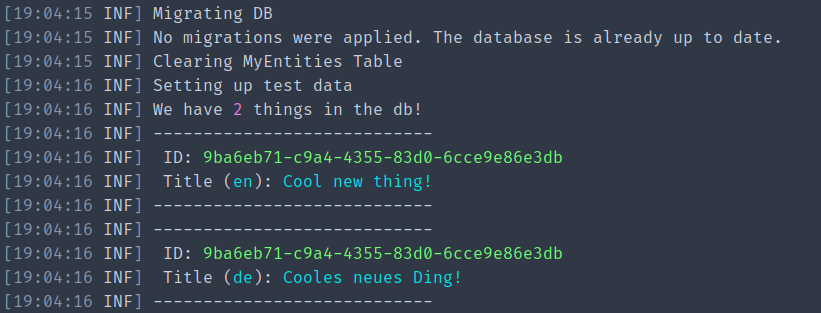
The same for if we search for German text:
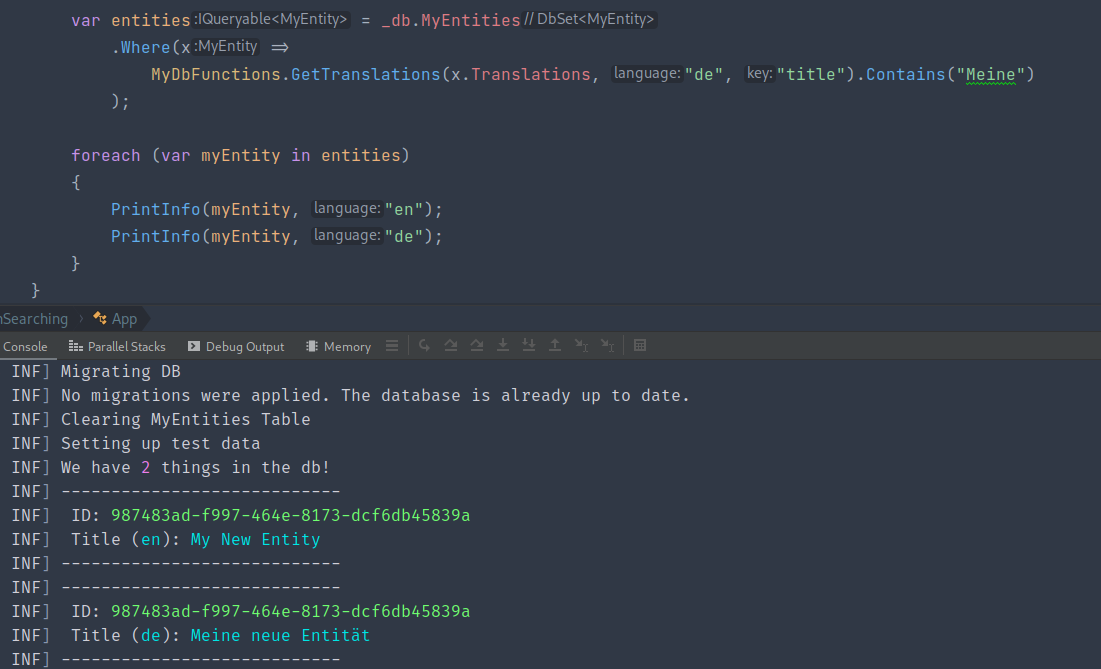
And if I turn back on the debug logs for executing sql, we can see it translated it correctly on the database!
SELECT m."Id", m."Translations"
FROM "MyEntities" AS m
WHERE STRPOS(json_extract_path_text(m."Translations", 'de', 'title'), 'Meine') > 0
Wrapping up⌗
This is was a headache and a half for me to figure out, so hopefully it can be of use to someone else!
Code for this post can be found on GitHub.